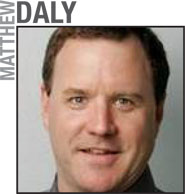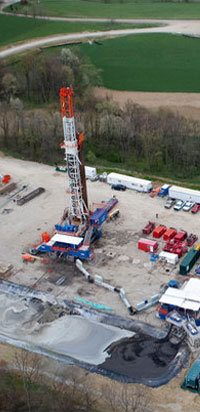 Secretary of the Interior Ken Salazar released a report that assesses climate change risks and their impact on water availability and management issues in the western United States.
Secretary of the Interior Ken Salazar released a report that assesses climate change risks and their impact on water availability and management issues in the western United States.
The report to Congress, prepared by Interior's Bureau of Reclamation and released this week, looked at a 112 global climate models and used three different emissions scenarios. The upshot? Adaptation is required.
 This is the first time a report this consistent in method and comprehensive in scope (the eight major western river basins) has been done on climate change risk to water supply by a government agency. Mandated by Congress and coming from a department-level position, this study is a high-level signal that the subject should be taken seriously. It finds that problems in the Colorado River basin, where it's going to be drier and hotter, are going to be much different than those in the Colombia River basin, where it's going to be wetter and you're looking at balancing fish impacts, hydro power, and flood control. Plus the institutional structures in all the basins are all different.
This is the first time a report this consistent in method and comprehensive in scope (the eight major western river basins) has been done on climate change risk to water supply by a government agency. Mandated by Congress and coming from a department-level position, this study is a high-level signal that the subject should be taken seriously. It finds that problems in the Colorado River basin, where it's going to be drier and hotter, are going to be much different than those in the Colombia River basin, where it's going to be wetter and you're looking at balancing fish impacts, hydro power, and flood control. Plus the institutional structures in all the basins are all different.I've got my eye on ... the upcoming contest between agriculture and cities. When cities look to expand, they're going to be looking to get their water from agricultural users. A few sharing agreements have already been worked out, mostly in California. For example, the Imperial Irrigation District leases water to Los Angeles and San Diego. Other areas are now looking at how best to protect farmers and food security but still transfer that water to urban users.
East, don't get too comfortable: In the Southeast, both in groundwater and surface water, water shortages are going to crop up with more frequency. Unlike the West, they don't have much reservoir capacity, they haven't really managed water withdrawals, and they don't have the same working relationships among water managers.
Click for additional coverage on the topic
 The report finds that the climate is expected to warm 5 to 7 degrees in the West over the coming century, raising significant issues. It forecasts a decreased water supply in the Colorado River basin and the Rio Grande River basin, which happen to be places where the population is increasing faster than the rest of the United States. So you've got the tension of decreasing water supply exacerbated by an increasing population. Something's gotta give.
The report finds that the climate is expected to warm 5 to 7 degrees in the West over the coming century, raising significant issues. It forecasts a decreased water supply in the Colorado River basin and the Rio Grande River basin, which happen to be places where the population is increasing faster than the rest of the United States. So you've got the tension of decreasing water supply exacerbated by an increasing population. Something's gotta give.Getting real: Planners have talked about zoning restrictions that would limit residential development in areas where water is scarce. When reporting in the West, I heard the phrase, "I don't want to live in a pre-owned house." That was a new one to me. The mentality is, "I want to build a new house." But maybe that's not going to possible in the future.
Patience, Grasshopper: In journalism, we like to look at what's going to change tomorrow. Well, nothing is going to change tomorrow. But in 40 years, a lot is going to change. And I think government officials need to start thinking long term. This report is trying to look 40 to 50 years ahead.
Click for additional coverage on the topic






